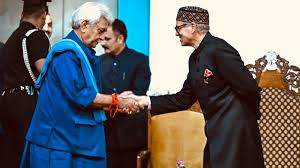Book Ban in Jammu & Kashmir: 25 Titles Pulled, Political Storm Erupts
By: Javid Amin | Srinagar | 08 Aug 2025
A Controversial Ban Sparks Political Reactions
Jammu and Kashmir’s political landscape was jolted this week after the administration ordered a ban on 25 books — many by internationally acclaimed authors — citing threats to public order and national integrity.
Former Chief Minister Omar Abdullah was quick to disown any role in the decision, stating that the ban was entirely imposed by Lieutenant Governor Manoj Sinha through the Union Territory’s Home Department, the only department under his direct control.
In an unusually sharp social media rebuttal, Abdullah posted on X:
“Get your facts right before you call me a coward, you ignoramus. The ban has been imposed by the LG using the only department he officially controls — the Home Department. I’ve never banned books & I never would.”
What’s Been Banned?
The administration’s list includes works long regarded as important academic and literary contributions to the Kashmir discourse:
-
Azadi — Arundhati Roy
-
The Kashmir Dispute — A.G. Noorani
-
Kashmir at the Crossroads — Sumantra Bose
-
Works by Seema Kazi, Ather Zia, Victoria Schofield, and others.
These books address topics such as:
-
Kashmir’s political history and autonomy
-
Human rights and gender justice
-
Conflict narratives and academic analysis
Authorities claim the titles promote “false narratives” and “secessionism.”
The Legal Groundwork
The ban draws its authority from Section 98 of the Bharatiya Nagarik Suraksha Sanhita (BNSS), 2023 — a provision enabling governments to seize and forfeit publications deemed a threat to India’s sovereignty and integrity.
Under the order:
-
All copies of the banned books are to be confiscated.
-
Police have been conducting raids on bookstores, libraries, and literary venues in Kashmir.
-
Possession or sale of these titles could attract criminal charges.
Critics argue the BNSS’s censorship powers are vague and lack independent judicial oversight.
Political and Civil Society Reactions
The ban has united political opponents and civil rights advocates in condemnation.
Mehbooba Mufti, PDP Chief
“Democracy thrives on the free exchange of ideas. Banning books cannot erase history; it only fuels division.”
Mufti linked the move to what she sees as a systematic shrinking of democratic space since the abrogation of Article 370.
M.Y. Tarigami, CPI(M) MLA
Described it as “a blatant act of censorship” and urged the administration to engage with dissent instead of suppressing it.
Mirwaiz Umar Farooq
Criticised the contradiction:
“You cannot ban books in the morning and host literary festivals in the evening.”
Amnesty India
Warned that:
“Censorship without judicial oversight silences dissent and undermines democratic values.”
Larger Political Context
Since August 2019, when Jammu and Kashmir’s special constitutional status was revoked, governance has been conducted without an elected assembly, placing key decisions directly in the LG’s hands.
Analysts say the book ban:
-
Reinforces perceptions of over-centralisation.
-
Adds to existing grievances over freedom of expression.
-
Risks international criticism at a time when the government seeks to promote Kashmir as a cultural and tourism hub.
Public Pushback
On social media, hashtags like #ReadBannedBooks and #BookBanJK have trended, with readers sharing passages from the prohibited works.
Bookstore owners, while wary of raids, privately admit that demand for the banned titles has surged. For many, the ban has had the unintended effect of generating more interest in the works.
Conclusion: Beyond Literature, It’s About Power
The Omar Abdullah–LG Manoj Sinha clash over the ban is not just about literature — it’s about control, accountability, and political positioning in a Union Territory still under direct central rule.
In a region where narratives are fiercely contested, deciding who gets to tell the story may be the most political act of all.



